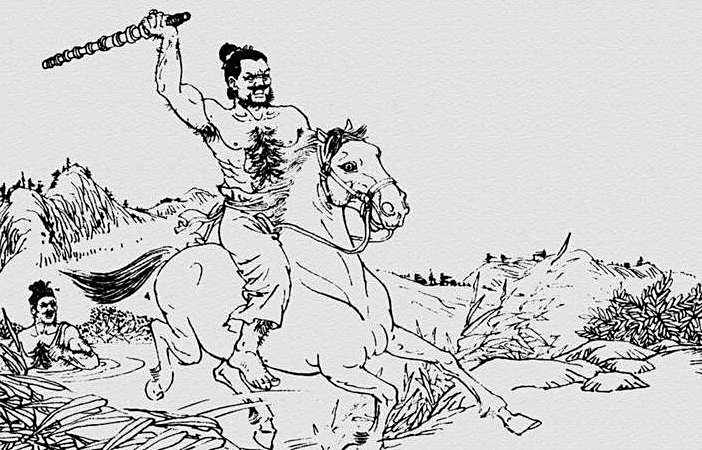Mude (1304-1390 November 11), also known as Ziran and Hengzhong, also known as Ajia Ade, was a Naxi ethnic group. He was the first hereditary magistrate of Lijiang and a Grand Preceptor of the Central Constitution. He held the fourth rank and was the leader of the Naxi ethnic group. He was a descendant of Mailiang. Below, the history encyclopedia editor will bring you a detailed introduction. Let’s take a look together!
Ajia Ade is the eldest son of chieftain Alijia. At the end of the Yuan Dynasty, Ali Ajia died of illness. Ajia Ade inherited the position of governor of Tong’an Prefecture and was later promoted to deputy envoy of the Lijiang Pacification Department. After Ajia Ade surrendered and submitted to the Ming Dynasty, Zhu Yuanzhang gave him the surname Mu and served as the magistrate of Lijiang from the 15th to the 23rd year of the Hongwu reign.
Emperor bestows surname
The ancestors of the Mu clan can be traced back to the Tang Dynasty. In the first year of Baoyou reign of Emperor Lizong of Song Dynasty (1253), Kublai Khan led the Mongolian army to conquer Dali. Attala of Jujin Prefecture led his army to resist, while Mailiang of Tong’an Prefecture not only prepared generous gifts to welcome them, but also actively cooperated with the Mongols to eliminate the resistance. After Kublai Khan ascended to the throne as the Great Khan, he conferred the title of “Chahan Zhang Xuanwei Si” on Mailiang, who was promoted from the second rank, and then worked hard to be promoted to “Tiao Zhulu Tongjun Si”.
Ajia Ade is the eldest son of chieftain Alijia. At the end of the Yuan Dynasty, Ali Ajia died of illness. Ajia Ade inherited the position of governor of Tong’an Prefecture and was later promoted to deputy envoy of the Lijiang Pacification Department. In the fifteenth year of the Hongwu reign of the Ming Dynasty (1382), Zhu Yuanzhang sent Fu Youde, Lan Yu, and Mu Ying to pacify Yunnan. The descendant of Mailiang and the leader of the Naxi tribe, Ajia Ade, surrendered to the Ming army. Zhu Yuanzhang removed his surname and gave it the surname “Mu”.
In the second year, the first generation chieftain of the Mu family, Mu De, personally went to Nanjing and presented the “Jade Horse” produced in Lijiang. Mu De, who is over seventy years old, trudged on the road for three months and finally met the founding emperor of the Ming Dynasty.
Zhu Yuanzhang was very pleased. After receiving him, he issued an edict to appoint him as the hereditary local official and governor, and to permanently command the defense of the stone gates and the control of the barbarians and Tartars, with four prefectures and one county under his jurisdiction. After Mu Chu, the son of Mu De, ascended the throne, he also personally went to the capital to pay tribute. During the 14th generation of the Ming Dynasty, at least twelve of the Mu clan chieftains visited the capital to pay tribute to the emperor nineteen times.
Political measures
Relying on the central government is an established “national policy” of the Mu clan chieftain. Mu Gong once said, “All my descendants who accept official positions granted by the court, defend border cities, remain unshakable, rebel, and cause trouble for the central dynasty.
We must follow the lessons passed down from generation to generation by the imperial court and not confuse or disrupt the teachings of the Mu family. ”There are plaques such as “Sincere Service to the Country” and “Respectful Virtue” hanging on each gate of the wooden mansion.
When the court encounters difficulties, the Mu family will generously donate. During the Jiajing period, a palace was built with a wooden height of 5600 taels of silver; During the Wanli period, the imperial court deployed troops to the outside world, and Mu Zeng “assisted Liao with a salary of 20000 taels of silver”; In the second year of Tianqi in the late Ming Dynasty (1622), the Mu family also donated 1000 taels of silver to help the country and rewarded those who died in battle for loyalty and filial piety.
For the military operations of the court in the southwest region, the Mu clan chieftains also tried their best to assist. The Ming Dynasty also reciprocated the kindness of the Mu clan chieftains and often rewarded them, making Lijiang one of the “Three Great Tufu of Yunnan” along with Menghua and Yuanjiang.
The jurisdiction of Lijiang Mufu extends to Zhongdian, Deqin and other places at the junction of Yunnan, Sichuan and Xizang. Under the rule of Mu Fu, the Lijiang Military Civilian Government implemented an administrative management system that integrated military and government, known as the “papaya system”. Wood “means” soldier “, and” papaya “means” barracks “. In this system, the people are both soldiers and farmers, joining the army in times of war and farming in times of peace.

